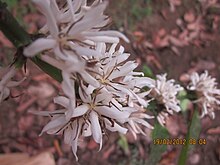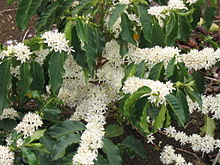Coffea
 | ||||||||||||||||||||||||||||||
Coffea is a genus of flowering plants whose seeds, called coffee beans, are used to make various coffee beverages and products. It is a member of the family Rubiaceae. They are shrubs or small trees native to tropical and southern Africa and tropical Asia. Coffee ranks as one of the world's most valuable and widely traded commodity crops and is an important export product of several countries, including those in Central and South America, the Caribbean and Africa.
Cultivation and use

Several species of Coffea may be grown for the seeds. Coffea arabica accounts for 75-80 percent of the world's coffee production, while Coffea canephora accounts for about 20 percent.[1]
The trees produce edible red or purple fruits called "cherries" that are described either as epigynous berries or as indehiscent drupes.[2] The cherries contain two seeds, the so-called "coffee beans", which—despite their name—are not true beans. In about 5-10% of any crop of coffee cherries, only a single bean, rather than the usual two, is found. This is called a peaberry, which is smaller and rounder than a normal coffee bean. It is often removed from the yield and either sold separately (as in New Guinea peaberry), or discarded.
When grown in the tropics, coffee is a vigorous bush or small tree that usually grows to a height of 3–3.5 m (9.8–11.5 ft). Most commonly cultivated coffee species grow best at high elevations, but do not tolerate freezing temperatures.[citation needed]
The tree of Coffea arabica will grow fruits after three to five years, and will produce for about 50 to 60 years (although up to 100 years is possible).[3] The white flowers are highly scented. The fruit takes about 9 months to ripen.



Ecology
The caffeine in coffee "beans" is a natural plant defense against herbivory, i.e., a toxic substance that protects the seeds of the plant. Fruits and leaves are both sources of caffeine as well and a tea can be made of the leaves, but neither are used commercially.
Several insect pests affect coffee production, including the coffee borer beetle (Hypothenemus hampei) and the coffee leafminer (Leucoptera caffeina).
Coffee is used as a food plant by the larvae of some Lepidoptera (butterfly and moth) species, Dalcera abrasa, turnip moth and some members of the genus Endoclita, including E. damor and E. malabaricus.
Research
In 2008 and 2009, researchers from the Royal Botanic Gardens, Kew named seven new species of Coffea from the mountains of northern Madagascar, including C. ambongensis, C. boinensis, C. labatii, C. pterocarpa, C. bissetiae, and C. namorokensis.[4]
In 2008, two new species of coffee plants were discovered in Cameroon: Coffea charrieriana, which is caffeine-free, and Coffea anthonyi.[5] By crossing the new species with other known coffees, two new features might be introduced to cultivated coffee plants: beans without caffeine and self-pollination.
In 2014, the coffee genome was published, with more than 25,000 genes identified. This revealed that coffee plants make caffeine using a different set of genes from those found in tea, cacao and other such plants.[6]
Species
- Coffea abbayesii J.-F.Leroy
- Coffea affinis De Wild.
- Coffea alleizettii Dubard
- Coffea ambanjensis J.-F.Leroy
- Coffea ambongenis J.-F.Leroy ex A.P.Davis
- Coffea andrambovatensis J.-F.Leroy
- Coffea ankaranensis J.-F.Leroy ex A.P.Davis
- Coffea anthonyi Stoff. & F.Anthony
- Coffea arabica L.
- Coffea arenesiana J.-F.Leroy
- Coffea augagneurii Dubard
- Coffea bakossii Cheek & Bridson
- Coffea benghalensis B.Heyne ex Schult.
- Coffea bertrandii A.Chev.
- Coffea betamponensis Portères & J.-F.Leroy
- Coffea bissetiae A.P.Davis & Rakotonas.
- Coffea boinensis A.P.Davis & Rakotonas.
- Coffea boiviniana A.P.Davis & Rakotonas.
- Coffea bonnieri Dubard
- Coffea brassii (J.-F.Leroy) A.P.Davis
- Coffea brevipes Hiern
- Coffea bridsoniae A.P.Davis & Mvungi
- Coffea buxifolia A.Chev.
- Coffea canephora Pierre ex A.Froehner
- Coffea carrissoi A.Chev.
- Coffea charrieriana Stoff. & F.Anthony
- Coffea cochinchinensis Pierre ex Pit.
- Coffea commersoniana (Baill.) A.Chev.
- Coffea congensis A.Froehner
- Coffea costatifructa Bridson
- Coffea coursiana J.-F.Leroy
- Coffea dactylifera Robbr. & Stoff.
- Coffea decaryana J.-F.Leroy
- Coffea dubardii Jum.
- Coffea ebracteolata (Hiern) Brenan
- Coffea eugenioides S.Moore
- Coffea fadenii Bridson
- Coffea farafanganensis J.-F.Leroy
- Coffea floresiana Boerl.
- Coffea fotsoana Stoff. & Sonké
- Coffea fragilis J.-F.Leroy
- Coffea fragrans Wall. ex Hook.f.
- Coffea gallienii Dubard
- Coffea grevei Drake ex A.Chev.
- Coffea heimii J.-F.Leroy
- Coffea homollei J.-F.Leroy
- Coffea horsfieldiana Miq.
- Coffea humbertii J.-F.Leroy
- Coffea humblotiana Baill.
- Coffea humilis A.Chev.
- Coffea jumellei J.-F.Leroy
- Coffea kapakata (A.Chev.) Bridson
- Coffea kianjavatensis J.-F.Leroy
- Coffea kihansiensis A.P.Davis & Mvungi
- Coffea kimbozensis Bridson
- Coffea kivuensis Lebrun
- Coffea labatii A.P.Davis & Rakotonas.
- Coffea lancifolia A.Chev.
- Coffea lebruniana Germ. & Kester
- Coffea leonimontana Stoff.
- Coffea leroyi A.P.Davis
- Coffea liaudii J.-F.Leroy ex A.P.Davis
- Coffea liberica Hiern
- Coffea ligustroides S.Moore
- Coffea littoralis A.P.Davis & Rakotonas.
- Coffea lulandoensis Bridson
- Coffea mabesae (Elmer) J.-F.Leroy
- Coffea macrocarpa A.Rich.
- Coffea madurensis Teijsm. & Binn. ex Koord.
- Coffea magnistipula Stoff. & Robbr.
- Coffea malabarica (Sivar., Biju & P.Mathew) A.P.Davis
- Coffea mangoroensis Portères
- Coffea mannii (Hook.f.) A.P.Davis
- Coffea manombensis A.P.Davis
- Coffea mapiana Sonké, Nguembou & A.P.Davis
- Coffea mauritiana Lam.
- Coffea mayombensis A.Chev.
- Coffea mcphersonii A.P.Davis & Rakotonas.
- Coffea melanocarpa Welw. ex Hiern
- Coffea merguensis Ridl.
- Coffea millotii J.-F.Leroy
- Coffea minutiflora A.P.Davis & Rakotonas.
- Coffea mogenetii Dubard
- Coffea mongensis Bridson
- Coffea montekupensis Stoff.
- Coffea montis-sacri A.P.Davis
- Coffea moratii J.-F.Leroy ex A.P.Davis & Rakotonas.
- Coffea mufindiensis Hutch. ex Bridson
- Coffea myrtifolia (A.Rich. ex DC.) J.-F.Leroy
- Coffea namorokensis A.P.Davis & Rakotonas.
- Coffea neobridsoniae A.P.Davis
- Coffea neoleroyi A.P.Davis
- Coffea perrieri Drake ex Jum. & H.Perrier
- Coffea pervilleana (Baill.) Drake
- Coffea pocsii Bridson
- Coffea pseudozanguebariae Bridson
- Coffea pterocarpa A.P.Davis & Rakotonas.
- Coffea racemosa Lour.
- Coffea rakotonasoloi A.P.Davis
- Coffea ratsimamangae J.-F.Leroy ex A.P.Davis & Rakotonas.
- Coffea resinosa (Hook.f.) Radlk.
- Coffea rhamnifolia (Chiov.) Bridson
- Coffea richardii J.-F.Leroy
- Coffea sahafaryensis J.-F.Leroy
- Coffea sakarahae J.-F.Leroy
- Coffea salvatrix Swynn. & Philipson
- Coffea sambavensis J.-F.Leroy ex A.P.Davis & Rakotonas.
- Coffea sapinii (De Wild.) A.P.Davis
- Coffea schliebenii Bridson
- Coffea semsei (Bridson) A.P.Davis
- Coffea sessiliflora Bridson
- Coffea stenophylla G.Don
- Coffea tetragona Jum. & H.Perrier
- Coffea togoensis A.Chev.
- Coffea toshii A.P.Davis & Rakotonas.
- Coffea travancorensis Wight & Arn.
- Coffea tricalysioides J.-F.Leroy
- Coffea tsirananae J.-F.Leroy
- Coffea vatovavyensis J.-F.Leroy
- Coffea vavateninensis J.-F.Leroy
- Coffea vianneyi J.-F.Leroy
- Coffea vohemarensis A.P.Davis & Rakotonas.
- Coffea wightiana Wall. ex Wight & Arn.
- Coffea zanguebariae Lour.
References
- ^ Arabica and Robusta Coffee Plant, at the Coffee Research Institute homepage. Retrieved December 2012.
- ^ Davis, Aaron P.; Govaerts, Rafael; Bridson, Diane M.; Stoffelen, Piet (2006). "An annotated taxonomic conspectus of the genus Coffea (Rubiaceae)". Botanical Journal of the Linnean Society. 152 (4): 465–512. doi:10.1111/j.1095-8339.2006.00584.x.
{{cite journal}}: Unknown parameter|lastauthoramp=ignored (|name-list-style=suggested) (help) - ^ [1]
- ^ "Seven species of wild coffee amongst Kew's haul of new discoveries". Royal Botanic Gardens, Kew. 22 December 2009.
- ^ Stoffelen, Piet; Noirot, Michel; Couturon, Emmanuel; Anthony, François (2008). "A new caffeine-free coffee from Cameroon". Botanical Journal of the Linnean Society. 158 (1): 67–72. doi:10.1111/j.1095-8339.2008.00845.x.
- ^ Callaway, Ewen (4 September 2014). "Coffee got its buzz by a different route than tea". Nature. doi:10.1038/nature.2014.15832. Retrieved 9 September 2014.

